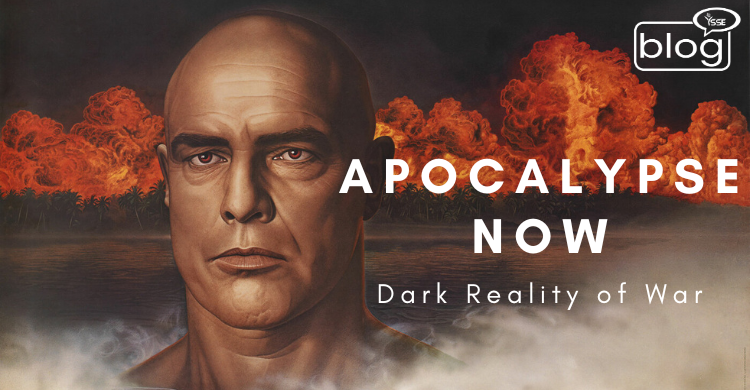Movie title: Apocalypse Now
Cast: Marlon Brando (Academy Award Winner), Martin Sheen (Academy Award Nominated), Robert Duvall (Academy Award Winner), Dennis Hopper (Academy Award Nominated), Laurence Fishburne, Harrison Ford (Academy Award Nominated), Jerry Ziesmer, Frederic Forrest, and Sam Bottoms.
Directed by: Francis Ford Coppola (5 Academy Award Winner)
Genre: Drama, War, Mystery
Released: 1979, 2001 (Redux), 2019 (Final Cut)
Duration: 153 minutes (Theatrical Cut), 183 minutes (Final Cut)
Awards: Palme d’Or, 6 Academy Award nominations, 2 wins
Synopsis:
Throughout 1970, Captain Willard (Martin Sheen) embarks on a dangerous and progressively surreal expedition across the river to locate and eliminate Colonel Kurtz (Marlon Brando), a once-great and best commander who has turned entirely insane. Willard journeys farther and deeper into the depths of darkness, accompanied by a Navy surveillance boat full of street-savvy youths, a surfing-obsessed Aviation Corps commander (Robert Duvall), and a mad independent photojournalist (Dennis Hopper).
Apocalypse Now shows the ironical nature of Americans that surrounded the Vietnam War in particular and Western powers in principle. The film is not openly antiwar, yet it takes great care to expose the tragedies of a war undertaken by the United States under the name of freedom and liberty. Coppola vividly displays the casualties and devastation caused by American involvement in the air raid, sampan, and bridge scenarios. Rather than assisting unarmed villagers, US soldiers kill them. They are outsiders in an odd location, but they behave just like they claim it, marking out turf and blasting without warning.
Theme:
The movie is a metaphor about a voyage inside the human mind, depicting how, amid war, the psyche gets darker past honor. While they progress along the river, Willard as well as the PBR team get more frustrated and detached from reality. Each has his own type of mental collapse. The chef visits the forest and has a close encounter with an Asian tiger; then he is no longer the same, his temper shortens, and he delves deeper into drugs. Lance, as well, falls for drugs, but he covers his face with camouflage, indicating a personality change. After Clean gets killed, Chief experiences a mental breakdown.
Psychology of Mind:
Willard, recently traumatized by his initial mission in Vietnam, develops an obsession with his target. What begins as a strange, intriguing journey turns into a plunge into the pit of hell, and everyone involved responds by hardening, retreating, and altering. The cinematography portrays their oncoming madness by shrouding their travels amid darkness or mist, creating an ever-more surreal environment.
Review:
This movie is now regarded as the best war film of all time by many critics. Marlon Brando’s acting, even in small screen time, stands by the testament of time to this day.
Robert Duvall and Martin Sheen became cultural icons, and many army recruits acted like them. Coppola’s direction in “Ride with the Valkyries” and “Chaos at the Do Lung Bridge” made him one of the greatest directors of all time.
The cinematography and the soundtrack create a hellish landscape with a surreal ambient tone.
Colonel Kilgore’s “I love the smell of napalm in the morning,” and “Charlie, don’t surf!” became iconic lines in movie history.
Now I welcome you to enjoy this surreal experience, not with the family (because of the R-rating), but with friends and fellow movie lovers. There are two, or maybe three, versions of it. The best is the final cut, but watch whatever suits you best. Check out the trailer here.
To read these types of blogs, please visit here
Writer
Sadi Reza,
Intern at Content Writing Department
YSSE

